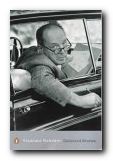a critical examination of Nabokov’s collected stories
 ‘Lips to Lips’ (1932) is a story which contains within itself a critique of the creative process. Rather like Nabokov’s other works which are autobiographically based, it is somewhat weaker than his more obviously inventive fictions: but it has its own amusing qualities, and it does cast light on Nabokov’s own practice as a writer.
‘Lips to Lips’ (1932) is a story which contains within itself a critique of the creative process. Rather like Nabokov’s other works which are autobiographically based, it is somewhat weaker than his more obviously inventive fictions: but it has its own amusing qualities, and it does cast light on Nabokov’s own practice as a writer.
Ilya Borisovich Tal is a semi-retired businessman with an itch for literary fame but no talent for writing. He completes a trashy romantic novel and is persuaded to submit it to an émigré review. The editors lavish praise on his work and compare him to classic writers, but they regret that publication will not be possible due to lack of funds.
Tal out of vanity gives them money to produce the review, and its next issue contains a measly three page extract from his novel, with a ‘To be Continued’ notice. Swollen with self regard, Tal then discovers that he has been tricked, and that the editors regard his work as vulgar rubbish. He reacts indignantly, but then realises that if he wishes to see the rest of the work in print he must forgive them: ‘He reflected that he was old, lonely, that his joys were few, and that old people must pay for their joys’ (RB,p.63)
The principal interest in the story is what it reveals about Nabokov’s literary credo. Tal is hopelessly untalented because he believes that creating fiction is a matter of emotional outpourings, and he cannot be bothered with the practical concrete matters of creating verisimilitude:
‘His leanings were strictly lyrical, descriptions of nature and emotions came to him with surprising facility, but on the other hand he had a lot of trouble with routine items such as, for instance, the opening and closing of doors’ (p.48)
The story contains extracts from the novel – ‘Their two hearts were beating as one’ (p.47) – so we know just how effective this ‘facility’ is. And when he boasts to a colleague that he is ‘polishing [his] phrasing’ (p.51) the re-write of his novel takes only one single day. Nabokov is obviously poking fun at Tal’s essentially romantic notion of literary creation, which is in stark contrast to Nabokov’s own belief in the importance of details, of concreteness, and the creation of precise effects.
Nabokov even illustrates the point he is making by offering a practical example which connects the inner and outer fictional worlds of Tal’s novel and Nabokov’s story which ‘contains’ it (and to which he gives the same name). As Tal is writing his novel we learn that the hero Dolinin is escorting a young woman out of a theatre. Tal makes several clumsy attempts to describe the detail of his transactions: ‘Dolinin went up to the cloakroom, and after producing his little ticket (corrected to ‘both little tickets’) – ‘ (p.47). He then creates for him an elegant cane to carry, without thinking ahead to its implications: ‘[he] did not foresee, alas, what claims that valuable article would make … when Dolinin … would be carrying Irina across a vernal rill’ (p.48).
That ‘vernal rill’ creates here perfectly the cliché and romanticism of Tal’s manner; carrying a heroine across raises it to a higher power of banality; and the forgotten cane is a detail which both illustrates Tal’s ineptness and forms a link between the inner and the outer narrative. For at the end of the story Nabokov has Tal himself visit a theatre to do the very thing he could not successfully describe for his hero; ‘Ilya Borisovich relinquished into the hands of an old woman in black his cane, his bowler, and his topcoat’ (p.61)
This is a very typically Nabokovian form of amusing the reader by having one of his fictions echoed by its meta-fiction. But what makes it doubly clever and therefore more acceptable is that he then introduces a variation into his own detail – for on leaving the theatre Dolinin forgets his can and has to go back for it, back to confront the people he has decided to forgive, which is the ostensible ‘point’ of the story.
The two separate fictions are thus united and focused onto a detail which therefore exists on three levels – in Tal’s clumsy invention, in his own life, and for us in Nabokov’s story. And at the same time it serves to act on two other planes, illustrating the theme of what is required to create successful fiction – for Tal’s lack of skill with a small detail is illustrated by Nabokov’s own dazzling variations upon it and his own successful integration of these variations into a cohesive narrative.
© Roy Johnson 2005
![]() Vladimir Nabokov: The Collected Stories – Amazon UK
Vladimir Nabokov: The Collected Stories – Amazon UK
![]() Vladimir Nabokov: The Collected Stories – Amazon US
Vladimir Nabokov: The Collected Stories – Amazon US
Vladimir Nabokov web links
Vladimir Nabokov greatest works
Vladimir Nabokov criticism
Vladimir Nabokov life and works